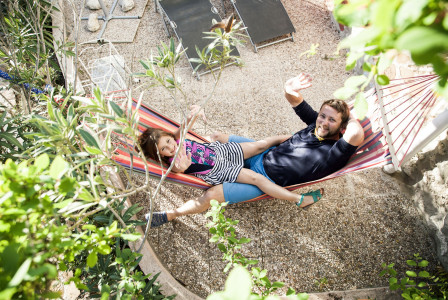Best practices
10 March 2025
Suderbyn Ecovillage: A Living Model of Sustainable Community and Green Innovation
Best practices
10 March 2025
Regenerative Green Transition
Proximity and social economy
Energy-renewables
+19 more
Login / create an account to be able to react
-
28

Suderbyn Ecovillage in Gotland, Sweden, is a cooperative community focused on sustainable living, renewable energy, and permaculture. It promotes social economy values through shared governance, education, and circular economy practices, serving as a model for eco-conscious living and resilience.
Topics
Sweden
NGOs / Non-profits
SMEs (a company with less than 250 employees)
-
Thematic area
-
-
Regenerative Green Transition
-
-
Interlinkages with other sectors
-
-
Proximity and social economy
-
Energy-renewables
-
-
Action areas and keywords
-
-
Access to Finance
-
Circular Economy
-
Clusters (including Cluster of social and ecological innovation)
-
Creating financial incentives and supportive regulation for green and circular social economy business models
-
Economic democracy
-
Education
-
Future workplaces
-
Housing
-
Innovation
-
Local employment
-
New business models
-
Reinforcing Business to Business collaboration for greener and circular value chains
-
Social Finance
-
Socially oriented territorial regeneration
-
Sustainable Finance
-
-
Ecosystem focus
-
-
Social economy
-
-
Scope of activity
-
-
Local/neighbourhood
-
National
-
Regional
-
Share
Suderbyn Ecovillage, founded in 2008 on Gotland, Sweden, is a community dedicated to sustainable living and ecological innovation. It was established with the vision of creating a self-sufficient society that minimises environmental impact while fostering social resilience. Following cooperative principles, the village operates through shared governance, permaculture, and renewable energy initiatives.
Over the years, it has become a hub for environmental education, hosting workshops and international sustainability projects while collaborating with European networks to advance green initiatives. As a living experiment in sustainability, Suderbyn demonstrates practical solutions for a regenerative future.
The ecovillage functions as a cooperative, non-profit organisation, promoting democratic decision-making and social innovation. It actively engages in research projects, workshops, and international collaborations, attracting volunteers and residents committed to sustainable lifestyles. Through this holistic approach, Suderbyn stands as a model for regenerative living and the social economy, demonstrating the potential of community-driven sustainability efforts.
Like many intentional sustainable communities, Suderbyn faces challenges related to financial sustainability, regulatory barriers, and land-use restrictions. Limited external funding and dependence on volunteer work make long-term stability an ongoing concern. Navigating Swedish land and building regulations while maintaining ecological principles requires constant adaptation. Achieving full self-sufficiency, particularly in renewable energy, demands continuous technical innovation and investment. Additionally, maintaining social cohesion and ensuring inclusivity in governance require ongoing effort.
To address these challenges, Suderbyn employs cooperative governance, ecological sustainability, and strategic partnerships. Financial stability is supported through grants, community initiatives, and EU-funded projects, while self-sufficiency is strengthened through permaculture and renewable energy integration. The community's strong participatory decision-making processes and international collaborations further reinforce its mission, positioning it as a model for resilient and regenerative living.
Suderbyn has had a lasting impact by fostering sustainable living, promoting renewable energy use, and inspiring community-driven solutions. Hundreds of volunteers and residents have been trained in permaculture, circular economy principles, and ecological resilience. Through EU-funded collaborations, the ecovillage influences both grassroots sustainability initiatives and global policy discussions. Its self-sufficiency model has inspired similar projects, showcasing tangible pathways to climate resilience. By integrating education, research, and hands-on sustainability practices, Suderbyn continues to contribute to a greener and more inclusive future.
One of the key lessons learned over the years is that resilience requires adaptability, continuous learning, and a balance between ecological ideals and practical realities. These insights have shaped Suderbyn’s evolution, reinforcing its role as a leading example of sustainable, community-driven living.
Looking ahead, the ecovillage aims to strengthen its renewable energy systems and food self-sufficiency while deepening collaborations with EU sustainability networks. It seeks to expand its impact by influencing policies on ecological living and continuing to serve as an educational hub for future generations. As it evolves, Suderbyn remains committed to exploring innovative solutions for climate resilience, social inclusion, and sustainable development.
Documents
Comments (0)
See also
Urban and Rural Wellbeing Highlights: June and July 2025
- Categories
- Proximity and social economy Agri-food Construction +62 more
Slovenia’s Green Urban Transformation: A Best Practice in Sustainable Urban Planning
- Categories
- Proximity and social economy Agri-food Construction +60 more
Financing the Ecosystem Recap: December – January
- Categories
- Partnerships Regenerative Green Transition Skills +68 more




